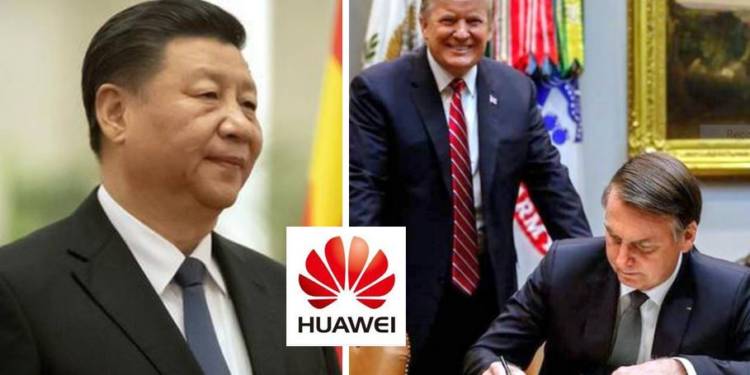Brazil, one of the largest markets for Chinese telecom giant Huawei, may be all set to give away its 5G contracts to European telecom players, Ericsson and Nokia, as the United States is in talks with the Brazilian government where the US proposes to fund the 5G infrastructure under the condition that Brazil dumps Huawei.
In an interview with Brazilian newspaper Folha de S Paulo, US ambassador to Brazil Todd Chapman said that taking Huawei out of the Brazilian market is a matter of “national security” to Washington and aims to “protect data and intellectual property, as well as sensitive information of nations”.
This comes as a big loss to the Chinese telecom giant as the company has strengthened its presence in the Brazilian market in the last two decades. Huawei has conducted 5G trials for all four major telecom companies-Telefonica Brasil SA, TIM Participacoes SA, America Movil’s Claro, and Oi SA- of Brazil. The company has also promised to set up a factory in Sao Paulo by 2022 with an investment of 800 million dollars.
Brazilian market was a sure shot for Huawei but now with the US ready to fund infrastructure costs if the government moves to European players, the deal looks very unlikely. And this means a huge loss for the Chinese telecom giant. “Who wants to make investments in countries where their information will not be protected?” said Chapman.
Previously, Canadian telecom companies shut the door for Chinese companies due to American pressure. Two Canadian telecom carriers – BCE Inc. (parent company of Bell) and Telus Corp have now decided to use equipment from Nokia and Ericsson to build out their next-generation 5G networks in Canada. This effectively means that Canada has shown China the door, along with its co-opted 5G technology provider.
Read: Bad news for Huawei as Canada finally grows a spine, shuts Huawei out for good
While Bell and Telus were both almost certainly going to use Huawei’s 5G equipment for rolling out the technology in Canada, however, much has changed in a short span of time. Bell already uses Huawei in its existing 4G network, however, the Chinese company’s involvement in 5G rollout has now been ruled out. Telus had gone as far as stating in February this year that it would be partnering with Huawei for rolling out 5G technology in the country. With both Bell and Telus rejecting Huawei quite vocally, the Chinese Communist Party is bound to be infuriated. All three major telecom carriers of Canada, namely Bell, Telus and Rogers are now working with Nokia and Ericsson.
The United States is using the same playbook as the one used in Canada and therefore, Huawei is set to suffer a second major jolt within a short span of a few weeks.
The global backlash against China and Chinese companies, especially telecom equipment sellers which were leading in the global 5G race like Huawei, ZTE, and Datang Telecom, has led to the revival of two moribund European companies which were on their metaphorical death beds. These are the Swedish multinational Ericsson and Finnish company Nokia.
Read: Nokia and Ericsson had become mummies of the Telecom world. The end of Huawei has resurrected them
The nine companies which sell 5G equipments are Altiostar, Cisco Systems, Datang Telecom/Fiberhome, Ericsson, Huawei, Nokia, Qualcomm, Samsung, and ZTE, of which three Chinese companies, Huawei, Datang and ZTE, have been leading the race, given the cheaper and efficient products.
But, the global backlash against China and reports of snooping by the People’s Liberation Army through these companies have done massive damage to Chinese 5G companies, especially Huawei.
The backlash against Huawei is coming from the governments (as in the case of United Kingdom), as well the telecom players themselves, like in Canada where two of the three major telecom companies announced that they would not deal with Huawei in their 5G rollout.
United States government has already told European countries to use Ericsson, Nokia, and Samsung products instead of Huawei, which many companies are expected to follow as they do not want to rage Trump administration, given the importance of American markets.
The stocks Ericsson and Nokia are trading in the green for the last few months, after years of constant decline, all thanks to Donald Trump and the sentiment against China and its companies after the outbreak of Coronavirus disease.
























